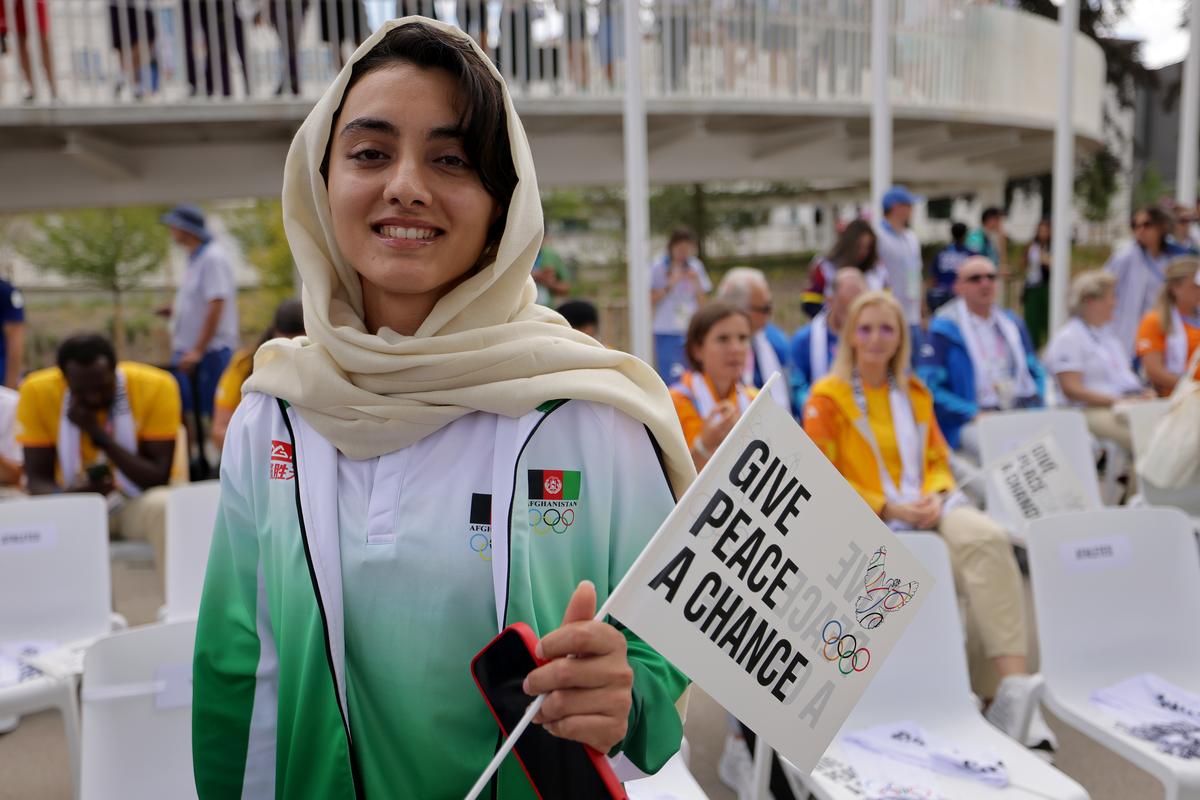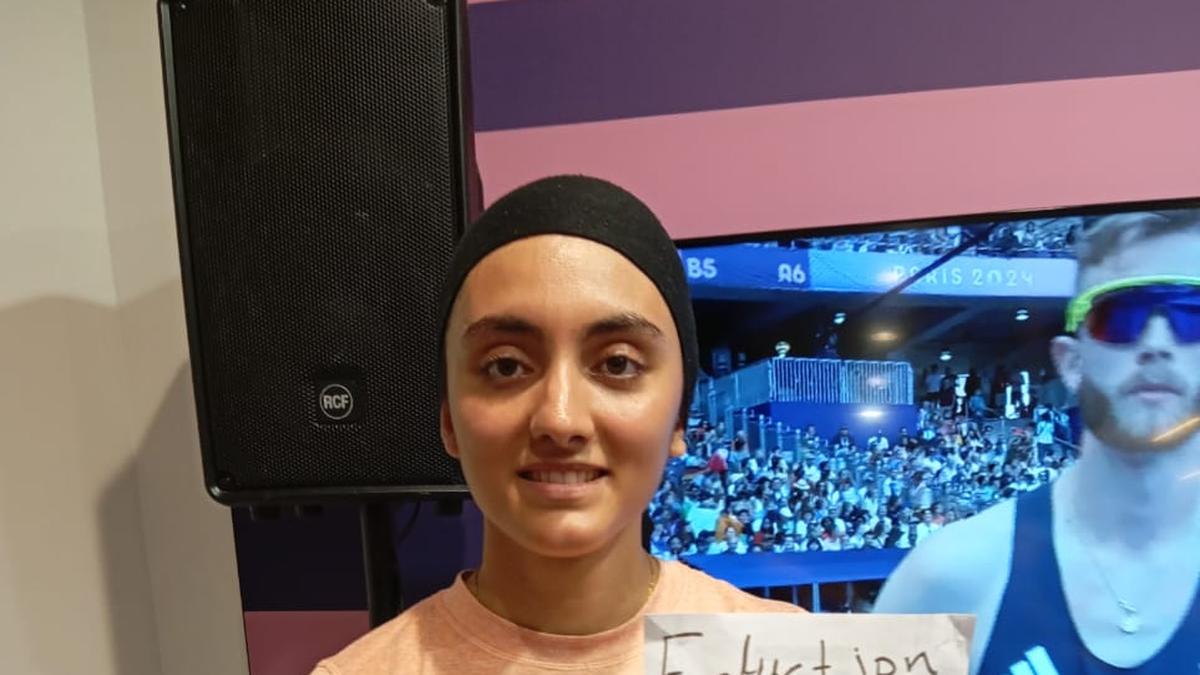Afghanistan sprinter Kamia Yousufi at Paris Olympics: I have to run for all the girls who can’t
The record books will show that Kimia Yousofi ran the slowest time in her preliminary round of the women’s 100m competition at the Paris 2024 Olympics. Competing in her third Olympics — she had already competed as a 20-year-old in Rio de Janeiro (2016) and then in Tokyo five years later — Yousofi finished with a time of 13.42 seconds, slower than the 13.29 she ran in Tokyo. Most athletes would be disappointed at this point, with years of struggle and hard work culminating in a less-than-impressive finish.
For Yousofi, this race is just the beginning. As the competition concludes, she removes the bib pinned to the back of her jersey, which proudly displays the red, green, and black emblem of Afghanistan. She turns the bib around, eager to show the camera what is written on the other side. It’s important that people see it.
“Education, Sport, our right,” it reads.
Competing in the preliminary rounds of a competition, even at the Olympics, isn’t going to attract many viewers. Most of the athletes in this round are here because they aren’t fast enough to race in the ‘real’ 100m event held about an hour later. They haven’t qualified for the Olympics based on the strict qualification standards, but they have been invited by the International Olympic Committee (IOC).
Each of the runners in the preliminary rounds has their own story. Faiqa Riaz, from Pakistan, is participating in her first international competition. She has been training in Lahore and has never run in a stadium as big and filled with as many people as the Stade de France.
Iakopo Filomenaleonisa of the Samoan Islands, a former professional bodybuilder, has made a multiple-day journey to make it to Paris, where she set a new national record (12.78).
Guam’s Regine Tugade-Watson was a member of the USA Naval Academy. All of them are chasing very personal, but genuinely important, goals.

Kimia Yousofi: “I have a message for Afghan girls. Look for opportunities, and then use them.”
| Photo Credit:
Getty Images
Kimia Yousofi: “I have a message for Afghan girls. Look for opportunities, and then use them.”
| Photo Credit:
Getty Images
Yousofi has her own story, too. But she’s not running just for that. “Of course, the Olympic Games is a big dream for every athlete, not just me. I’ve run at the Tokyo Olympics and the Rio Olympics. But in them, I was running just for myself. I was running because I loved to run. But now I’m here for Afghanistan’s girls. I almost forgot my dream. I almost forgot everything. I worked hard for three years. But all these things are for Afghanistan’s girls,” she says.
Exactly three years ago, Yousofi had returned home to Kabul from the Tokyo Olympics, where she had set a new personal best in the 100m. She was the flag bearer for Afghanistan in the opening ceremony. Just a week after she returned, though, the Taliban swept through the country and captured the capital.
“I was in Kabul when the Taliban came. I wanted to stay because I felt I was from this country. My people needed me. But a lot of people told me they couldn’t guarantee my safety. I was a woman with a public face because I’d carried the flag of Afghanistan just a few days before. I had to flee. I went first to Iran, and then from there, Australia helped me get a visa to come there,” she says.
Yousofi has made a life for herself in Sydney, where her family joined her. She’s learnt to speak English. Having run in two Olympics already, her mother had told her that perhaps it was time to call time on her career. “She says, ‘Kimia, you are a girl; stop pushing yourself; don’t make it so hard for yourself’. But I can’t do that. I don’t allow anyone to decide for me. Thanks. I’m going to express my whole attitude. I have to run for all the girls who can’t,” she says.
It’s not just that they can’t run. Ever since the Taliban took over the country, girls have been banned from even studying. “Our girls in Afghanistan, our women, want their basic rights — education, the ability to play a sport. They want to be treated as human beings. They want to be able to decide what they want to do with their lives. It’s been taken away from them for the last three years. I’m fighting for that,” she says.
Yousofi is determined to fight for all Afghan women. That’s why she chose not to compete in the Olympics as a refugee player, but instead to represent Afghanistan. The Olympic committee for Afghanistan has been operating from overseas since the Taliban takeover.
“I had to choose between competing as a refugee or an Afghan. I was born not in Afghanistan but in Iran as a child (her parents had fled to that country back in 1996 when she was born). So, when I opened my eyes for the first time, it was as a refugee. But I am an Afghan. I will always represent my women and people. I will always wear my three colours: black, red and green. I will wear my traditional clothes,” says Yousofi, who runs in a hijab and leggings.
Yousofi ran even though she wasn’t in the best physical condition. Although she had prepared well for the Olympics, she had picked up an allergy in the weeks before the event and then injured her right knee right before the race. “My knee was really sore, but I said I’m just going to run. I kept icing it and took pain tablets to reduce the pain. But I had to run,” she says.
She will do all of this simply to remind Afghan girls that there is another world out there. “I have a message for Afghan girls. Look for opportunities, and then use them. Even if you get a small one, use it. Don’t give up. Don’t let others make your decisions for you,” she says.



